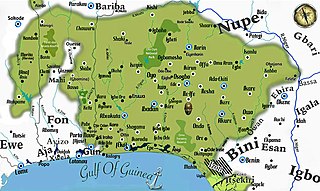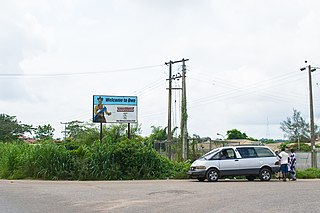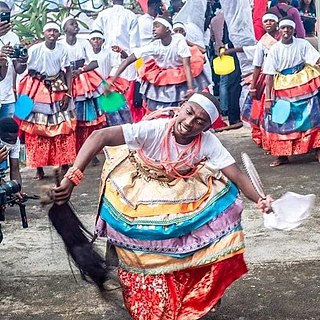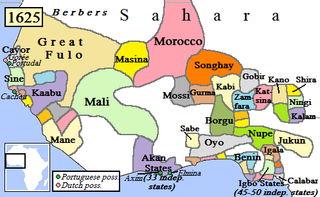
Yorubaland is the homeland and cultural region of the Yoruba people in West Africa. It spans the modern-day countries of Nigeria, Togo and Benin, and covers a total land area of 142,114 km2 (54,871 sq mi). Of this land area, 106,016 km2 (74.6%) lies within Nigeria, 18.9% in Benin, and the remaining 6.5% is in Togo. Prior to European colonization, a portion of this area was known as Yoruba country. The geo-cultural space contains an estimated 55 million people, the majority of this population being ethnic Yoruba.

Owo is a local government area in Ondo state, Nigeria. Between 1400 and 1600 CE, it was the capital of a Yoruba city-state. The local government area has a population of 222,262 based on 2006 population census.

The Itsekiri are an ethnic group who mainly inhabit Nigeria's Niger Delta area. They speak a Yoruboid language and can be found in Ondo, Edo and Delta State. The Itsekiris presently transcends a population of over 1 million people and live mainly in parts of Ondo, Edo and majorly in the Warri South, Warri North and Warri South West local government districts of Delta State on the Atlantic coast of Nigeria.
Oba Sir Olateru Olagbegi II, was the King (Olowo) of Owo, an ancient city which was once the capital of an Eastern Yoruba city state in Nigeria.

The Yoruba of West Africa are responsible for a distinct artistic tradition in Africa, a tradition that remains vital and influential today.
Odigbo is a Local Government Area in Ondo State, Nigeria. Its headquarters are in the town of Ore.
The Itsekiri language is a major branch of the Yoruboid group of languages, which as a group, is a key member of the Volta–Niger sub-family of the Niger–Congo family of African languages. Itsekiri is spoken by nearly 1,000,000 people in Nigeria as a first language and by many others as an additional language notably in the Niger Delta and in parts of Edo and Ondo states of Nigeria. The other key members of the Yoruboid group are Yoruba and Igala along with the various Yoruba dialects spoken in Benin and Togo.

Nigerian traditional rulers often derive their titles from the rulers of independent states or communities that existed before the formation of modern Nigeria. Although they do not have formal political power, in many cases they continue to command respect from their people and have considerable influence in their community.

The Akure Kingdom is a traditional state with headquarters in Akure, Ondo State, Nigeria. It is the successor to an ancient Yoruba city state of the same name. The ruler bears the title "Deji of Akure".

The Olowo of Owo is the paramount Yoruba king of Owo, a city in Ondo State, southwestern Nigeria which was the capital of Yoruba between 1400 and 1600 AD. Ojugbelu Arere, the first Olowo of Owo was the direct descendant of Oduduwa known as the father of the Yorubas. The current Olowo of Owo is His Imperial Majesty, Alayeluwa, Oba Ajibade Gbadegesin Ogunoye III, who is also the 32nd paramount ruler of Owo kingdom. The name Owo meaning Respect, is said to have been coined from the intrigue attitude of Ojugbelu, the first Olowo of Owo who ruled the kingdom from 1019 to 1070.
This is a list of the royal titles of Yoruba monarchs. It is not in the order of seniority.
The Igogo festival is a Yoruba festival held in Owo, Nigeria. It is held annually in September to honor Queen Oronsen, a mythical wife of Rerengejen. During the festival, the incumbent Olowo of Owo, Oba Ajibade Gbadegesin Ogunoye III, and high chiefs of Owo Kingdom dress like women with coral beads, beaded gowns and plaited hair. The wearing of headgears and caps as well as the beating of drums and firing of guns are forbidden during the festival.

The Ojomo Oluda is the Yoruba king of Ijebu, Owo in Ondo State, southwestern Nigeria. The king is believed to be a descendant of Ojugbelu Arere, the pioneer Olowo of Owo. Ojomo Oluda also celebrates the Igogo festival with the incumbent Olowo of Owo since they are the descendants of the late Olowo Rerengejen, who married Oronsen, the goddess that brought about the annual Igogo festival.

Kofoworola Oladoyinbo Ojomo is the paramount Yoruba king of Ijebu, Owo in Ondo State, southwestern Nigeria. He is a descendant of Ojugbelu Arere, the pioneer Olowo of Owo.
John Agboola Ojomo Agunloye II was the paramount Yoruba king of Ijebu, Owo in Ondo State, southwestern Nigeria. He died on 31 May 2003 and was succeeded by King Kofoworola Oladoyinbo Ojomo, who ascended the throne on 13 June 2004.

Obalufon Alayemore, also referenced as Ọbalùfọ̀n II or just Alayemore, was the Third Ooni of Ife, a paramount traditional ruler of the Ife Empire. He succeeded his father Obalufon Ogbogbodirin. Obalufon Alayemore was forced out of power by Ooni Oranmiyan and later returned with the help of local residents to reclaim the throne.

The Ekiti people are one of the largest historical subgroups of the larger Yoruba people of West Africa, located in Nigeria. They are classified as a Central Yoruba group, alongside the Ijesha, Igbomina, Yagba and Ifes. Ekiti State is populated exclusively by Ekiti people; however, it is but a segment of the historic territorial domain of Ekiti-speaking groups, which historically included towns in Ondo State such as Akure, Ilara-Mokin, Ijare, and Igbara-oke. Ogbagi, Irun, Ese, Oyin, Igasi, Afin and Eriti in the Akoko region, as well as some towns in Kwara State, are also culturally Ekiti, although belong in other states today.
The Ìjẹ̀bú people are a Yoruba subgroup hailing from Nigeria. located in the southwest of the country. The Ijebu people speak the Ijebu dialect of the Yoruba language.
Ode Usen, also known as Ufe kekere and Ode Awure is the name of a small town in Edo state, Nigeria. It also doubles as the name of a Yoruba subgroup consisting of culturally related villages situated between Ofosu in the west and Ogbese in the east. Usen is surrounded on all sides by smaller villages and farmsteads known in the local Yoruba dialect as Egunre. some of the villages under the authority of Usen include; Arere, Oladaro, Arekpa, Ogunweyin, Ogidigbo, Ilorin (Ulorin), Ukankan, Ajegunle, Obome, Aghakpo, Leleji, Ofaran, Okeodo, Adeyanba. These villages were all founded by people from Usen and speak the same dialect of the Yoruba language. There are also other communities that speak the same dialect of the Yoruba language as Usen, such as; Egbeta, Utese and Igue Ogho between Ekiadọlọ and Usen.










